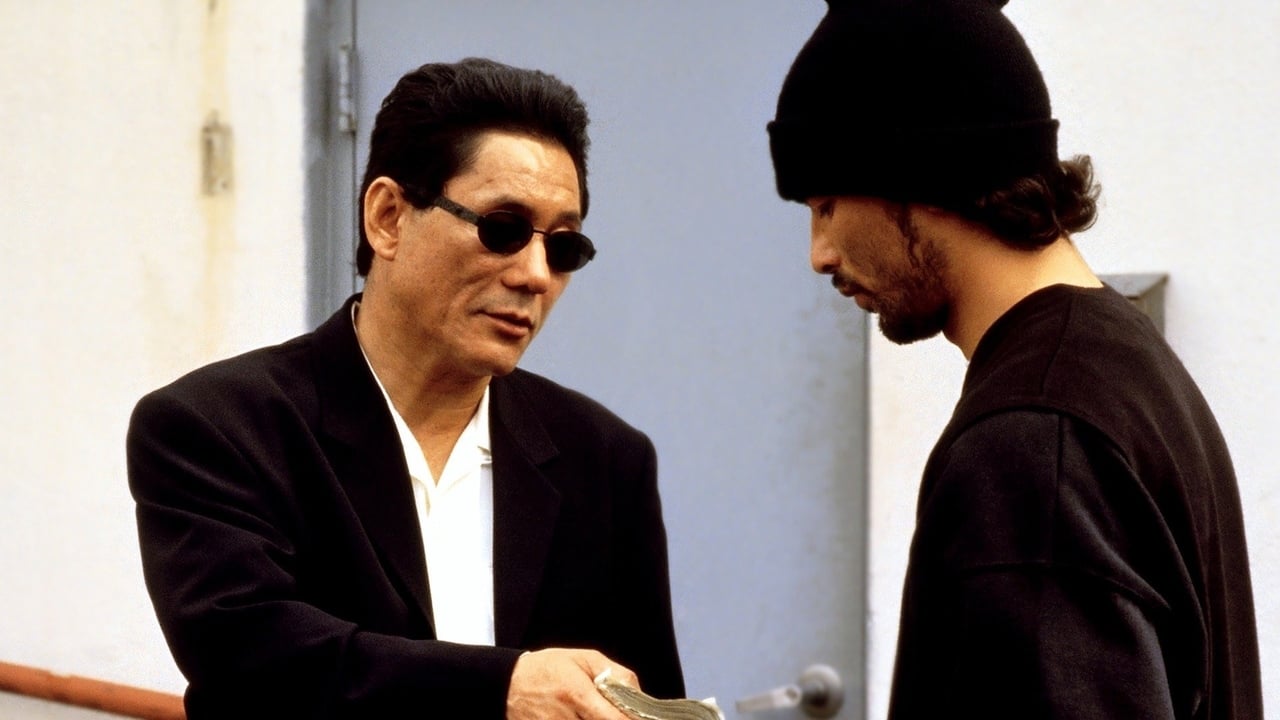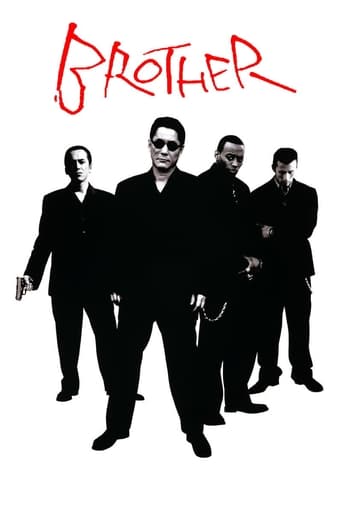LeSamourai86
Exiled from Japan, Yamamoto, a member of the Yakuza, arrives in Los Angeles. Here, his brother is the leader of a small-time multi-racial gang, and Yamamoto encourages them to expand by taking over the local drug trade.Brother really struck a chord with me because of what it shows regarding race relations. It shows something I believe in very deeply and that is when forming relationships (be it love or friendship) with people, their character and principles should be the prime consideration and race should not factor into it.Why? One reason is that it makes more sense to affiliate with people based on character and principles rather than race, because character and principles can change but race cannot; if I refuse to be friends with a person of race X, then that person cannot ever be friends with me as long as he does not change his race. Additionally, if race is the prime consideration, then it is possible one may disregard or overlook positive qualities in a person to prevent the creation of a relationship with them, and even more dangerously, one may disregard negative character traits just so they can connect with someone.These are not conjectures, rather they are observations I have made in the almost thirty years I've been alive. Unfortunately, they're observations I have made much too often, starting from my formative years all the way to the somewhat cynical adult I am now. It really hurts me to see people from two countries detest each other over something that happened between their respective countries decades ago, even though these individuals had nothing personally to do with that event. Heck, I've met many of these people, whose default position is that they hate individuals from a certain country.Not often does a film come along that so eloquently speaks to me about issues that I care very much about. This is why I've somewhat unintentionally gone off on a tangent.The Yakuza members in this film are portrayed as ruthless individuals who carry out despicable acts and have no qualms about murdering innocent people to fulfil their needs and the needs of their (Yakuza) brothers, thus it is rather ironic that they do have some admirable qualities. One of those is that they consider the brotherhood between Yakuza members to be of more importance than familial relations (that is meant to be the ideal). Having seen this in the movie, I cannot help but think how much better it would be if we could apply a similar principle to our dealings with the people we meet every day (for good causes, of course, not criminal!).While many of the characters in this film are deeply flawed in many ways, such as the blind loyalty they show to their bosses, they are also shown to be very human. To pass the time, they play cards and basketball and various other games; they laugh and they make jokes; they give each other gifts; they have people they care about and they care about each other. Depictions of leisure time and activities to portray the humanity in characters we might traditionally hate is a great strength of Takeshi Kitano the director, and is present in his other films (Boiling Point and the masterpiece Sonatine come to mind). The resulting effect is that it is impossible to hate the characters, no matter how much you may want to.As in all Kitano films, there is a lot of humour, including some laugh out loud moments, and none of it feels out of place. As well as humour, many of Kitano's other trademarks are present, including off-screen violence (although there is much on screen violence as well, some of it eye-watering), lingering shots that continue after the scene has ended and ellipses, which is the technique of jumping from one scene to another and leaving what happened in between to the imagination.Regular Kitano collaborator, Joe Hisaishi, provides the score, and what a beautiful and pensive score it is. Someone who has not watched the film might feel the score would be out of place in a gangster film, however, it fits perfectly. As I write, the track "I love you… Aniki" is playing on my CD player, and thinking about the themes and characters in the film, I feel, at the risk of sounding unmanly, choked up.Takeshi Kitano brings Japanese style and sensibility to a gangster film set in America, and this was, based on an interview, his intention. This decision works very well and results in a poignant crime drama with likable and well-drawn characters. I did not appreciate Kitano's work five years back, however, he is now one of my favourite directors. I have not yet seen all his films but out of the ones I have, I highly recommend Kikujiro, Sonatine, Hana-Bi, Violent Cop, Dolls, Boiling Point and Zatoichi. I urge you to seek out and watch them, as well as Brother, of course.
calistis
Fantastic portrayal of the ruthless and die-hard Yakuzas. The great storyline manifests emotional and creative intelligence, and incites continuous interest. There is some humour amongst the intense action and gripping plot. A must see.There are plenty of assassinations, assassination attempts, demonstrations of power/allegiance/ruthlessness/respect. The movie shows the felicity that comes from power and wealth, and the terrors of living in fear of being assassinated and losing your friends and family to bullets and bombs.CAREFUL, THE FOLLOWING IS A SPOILER:A Yakuza's (Aniki) boss is killed, and with the Japanese police interfering in the gang war and Aniki's gang joining up with the enemy gang, "Aniki" (Big Brother) decides to move to the U.S. He finds his younger brother and immediately gets himself into gang activity and starts a gang and war of his own in America.
Voxel-Ux
After my first introduction to Takeshi ("Beat") Kitano through Batoru rowaiaru and Batoru rowaiaru II: Chinkonka, my interest was aroused. Therefore I sat down to watch Brother, via Film4, peppered with positive expectation. I was not disappointed.There is something about the man Kitano which is most intriguing. This element of the man translates onto his films most effectively. Fortunately I was completely ignorant as to what to expect from Brother except the rudimentary blurb within my television programme guide. Immediately, upon seeing Kitano, I was transfixed. Within his acting he carries the ability shared only with Steve McQueen which can only be summed up through a critic's quote I read once in the 70s referring to McQueen, "He can act with the back of his head". Mr Kitano possesses this same gift. Add to this the fact that he wrote, edited, directed and starred in Brother only stimulates my interest in the man to a greater degree.Beat Takeshi has a menace about him and his character within this film is unpredictable or, as a line in this film commented: inscrutable. Perfect for the character of Aniki. Despite the violence within this epic the film is primarily Kitano's character and relationships.True, he goes from incident to incident placing himself in ever more perilous situations as this is the character of the story but I see more to the film than this surface fundamental impression. The film appears to be more in line with the title: Brother. It is a story centring on relationships, albeit relationships within quite a turbulent backdrop. The violence should not get all the focus.Another reviewer mentioned tying this film to such stories as Reservoir Dogs; but I disagree. Relationships, made clear in the dénouement, strengthen this argument. One knows the background of Aniki, a violent and nefarious fellow, but his character, the character of the man, outshines what he actively does in the story, objectively speaking. His relationship with the superbly acted Omar Epps as Denny is touching. Clearly the highlight of the film.Well done, Takeshi Kitano. Well done.

